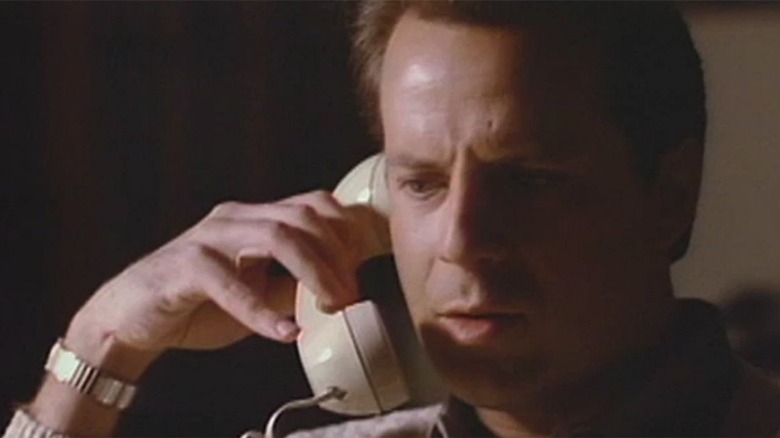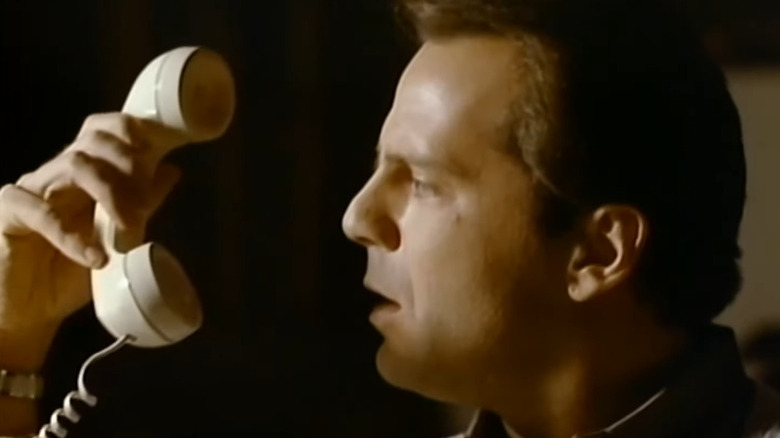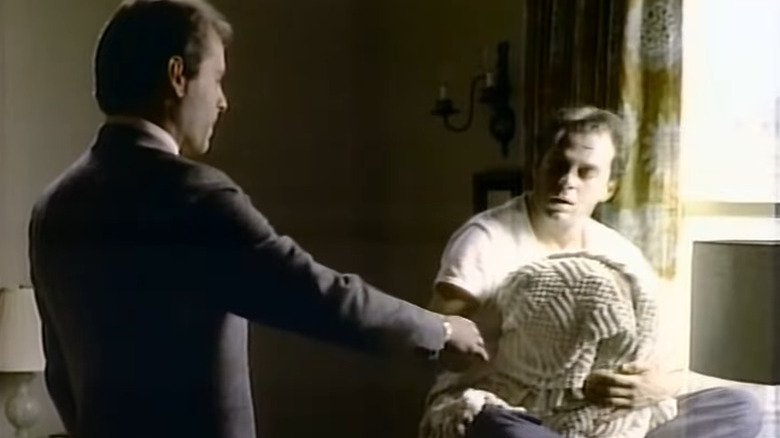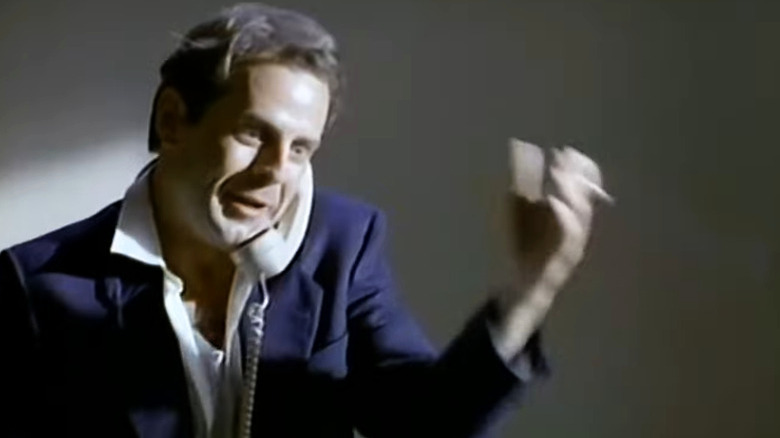Wes Craven Directed Bruce Willis — And Bruce Willis — In This Episode Of The Twilight Zone
For over half a century "The Twilight Zone" has been the gift that keeps on giving. Classic episodes of the sci-fi/horror/fantasy anthology series have spanned out across the decades, from influential writers, iconic filmmakers, and once-and-future superstar actors. You could throw a dart at a list of episodes and you'd probably hit a gold mine of exciting storytelling and Hollywood trivia.
And if you aim that dart high enough, you might just hit the very first episode of the 1985 "Twilight Zone" reboot on CBS, which started off on a very strong note. The first installment in the pilot episode was a freaky psychological horror tale from acclaimed author Harlan Ellison, legendary horror director Wes Craven, and a very young Bruce Willis, just a few months after the debut of his star-making TV series "Moonlighting."
What's more, Bruce Willis's co-star was a really big deal too. You might even say he was just as big as Bruce Willis.
Because Bruce Willis's co-star was also Bruce Willis.
Call me by my name
"Shatterday" stars Willis as Peter Novins, a P.R. agent who picks up the phone at a bar and accidentally dials his own number. Novins immediately realizes his mistake but before he can hang up, somebody unexpectedly picks up at his house. And the person on the other end of the line is also Peter Novins.
Over the course of several phone conversations, the first Peter Novins and the second Peter Novins realize that they're not victims of a practical joke, and that somehow there are now two of him, with the same memories and the same aspirations. When they realize they cannot both live the same life the first Peter Novins declares war on his doppelgänger, canceling his bank accounts and burning bridges with businesses and grocery stores in order to force the second Peter Novins to leave the house so he can reclaim his territory.
The second Peter Novins adopts a very different strategy. He decides to be the better version of Peter Novins, mending fences with old lovers, quitting his morally compromising job, and inviting his estranged mother to move in with him. While the second Peter Novins thrives, the first deteriorates until he's a quivering mass in a hotel room.
The second Peter Novins shows up and tells the first that he looks terrible. "I haven't quite been feeling myself these days," the first Novins darkly jokes. As they ponder the strange situation they're in, they consider the Jungian archetypes, and the second Novins surmises that, "When I first got loose I was the Shadow. Now I'm the Self."
"Now I'm becoming the Shadow," the first Novins assumes.
"No," the second Novins says. "You're becoming a memory." They shake hands, and the first Novins literally fades away.
Bruce Willis: The Adventure Begins
"Shatterday" was based on a short story by Harlan Ellison, who also wrote the classic "Star Trek" episode "The City on the Edge of Forever" and the "Outer Limits" episodes that inspired "The Terminator" (to name just a few of his many credits). The title refers to the episode's title cards, also from the short story, which replace the usual names of the week with more distressing versions: Someday, Moansday, Duesday, Woundsday, Thornsday, Freeday, and finally Shatterday.
It's tempting to look back on this episode of "The Twilight Zone" as a piece of stunt casting, in which one of the most famous and popular actors in the world plays two versions of himself. Twice the star power at half the price. But like the classic Robert Redford episode, context is everything: "Shatterday" aired on September 27, 1985 and Bruce Willis had only been a TV star for half a season, because "Moonlighting" was a mid-season replacement that debuted the previous March. In the episode's commentary track, Wes Craven refers to the actor as "virtually undiscovered" in 1985. Willis didn't even have a single credited role in a motion picture by this point, and only one credited TV appearance besides "Moonlighting," playing an arms dealer on "Miami Vice."
Craven, however, was just coming off the release of one of his biggest hit films, the original "A Nightmare on Elm Street." And while the filmmaker's career was always a little up and down, with classics and blockbusters interspersed between projects that struggled to find an audience, he'd already directed some of the most acclaimed films of the previous 15 years, like "Last House on the Left" and "The Hills Have Eyes." Craven, who had degrees in both English and Psychology, was a perfect fit for the episode's unusual psychological themes, which aren't just upsetting but also thoughtful and challenging.
A good 'Shatterday' to die hard
The episode's writer, Alan Brennert, brought "Shatterday" to the producers as a possible short story to adapt, and their meeting with Harlan Ellison about the rights led directly to Ellison's involvement with the series as a writer and a creative consultant. In the DVD commentary, Brennert recalls that the opening scene where Novins first calls himself had to be rewritten many times to make it plausible that Novins would believe that this fantastical situation was real. After half a dozen rewrites at Ellison's request, it was suggested Ellison rewrite the scene himself. The next day Brennert arrived at the office where Ellison, who frequently wrote on a balcony in a bathrobe while smoking a pipe, called out to him, "You son of a b****!"
"A little tougher than it looked, huh Harlan?" Brennert mused. Ellison's version of the scene was the version that was filmed, and it includes a line where Novins asks if his friend "Alan" is impersonating him, as an homage to the episode's other writer. Ellison's persnickety nature also extended outside of the writing process. Craven recalls he visited and yelled at him so much so much that the director had to have him banned from the set.
"Shatterday" started the reboot of "The Twilight Zone" off on an excellent note. It's an unusual story that goes in unexpected directions, eliciting horror not from violence but from an existential crisis, as a person literally decides to be a better version of himself, and effectively kills the man he used to be in the process. Willis absolutely kills it, giving a performance that would turn out to be indicative of his career highlights: deeply committed, unexpectedly sympathetic, and captivating at all times.



